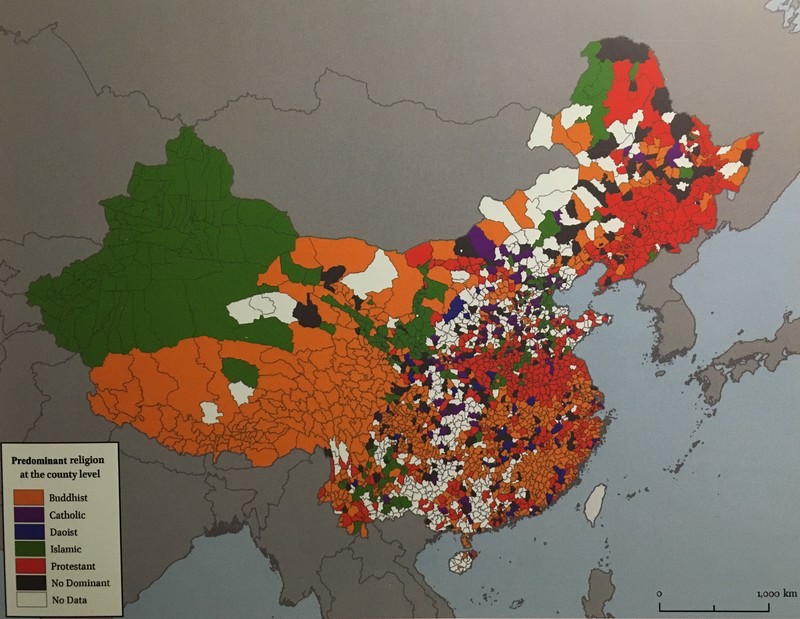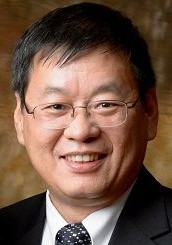In the 1980s, people around me began to wake up to spirituality one by one. One example I mentioned in my book Religion in China: Survival and Revival under Communist Rule. During my graduate study of Western philosophy, a retired factory worker, Mr. Niu, came to teach ancient Greek to my fellow graduate students, and he did it as a volunteer. Think about that: a retired manual laborer in China knew the Greek language. How unusual was that? I was also amazed when he said that he had read all the books by Marx, Engels, Lenin, Stalin, and Mao. He brought us a stack of papers he wrote, which were reflections and comments on those Communist writings. In these papers he repeatedly declared himself to be a “socialist new man” without superstitious or religious beliefs.
After I got my master’s degree in 1987, I became a professor at the People’s University of China in Beijing. Then I learned that Mr. Niu became a professor at the reopened Peking Seminary. When I visited with him at the Christian seminary, he told me that he had recovered his faith. It turned out that he was an ordained minister before the Communist Revolution, and he was a scholar of biblical studies and wrote a thick book on the New Testament, which was published in Hong Kong.
My book was dedicated to my father, who is another example of spiritual awakening. My father was a lifelong Communist Party member. He joined the Communists during World War II, when the only resistance force to the Japanese occupation in my hometown area was the Communists. In the 1950s and 1960s, he was a commune leader. In the 1970s, he became an official in a hospital. After he retired in 1984, he began to explore spiritual things, practicing Tai Chi and Qigong, the slow-motion meditative exercises, and reading about various religions. However, when I told him that someday I might become a Christian, he reacted strongly, and said, “if you do, that would mean betraying me.”
Surprisingly, however, he himself turned to Christianity. My mother converted first, then my father joined her. My mother was semi-illiterate, so my father had to read the Bible for my mother, and they often prayed together. One day he shared with me a near-death experience he had had many years ago. In a cold winter, he was riding a bicycle to cross a river on the ice. Suddenly the ice cracked in front of him, and he tumbled into the river and slipped under the thick ice. Then, he saw someone with a white garment guiding him to the hole in ice, so that he could climb out and get home. Was that Guanyin Bodhisattva or Jesus Christ? He said he did not think about it again until many years after his retirement. Eventually he decided that it was Jesus who saved him. But because he was a Communist party member and an official before retirement, the party-state authorities did not allow the church to baptize him. Eventually, when he became very ill, he requested to be baptized. A church elder baptized him secretly.
The spiritual awakening or re-awakening happened not only to older people who grew up before the Communist Revolution. More and more young people who have been indoctrinated with atheism have turned to religion as well. An important turning point was the 1989 student movement for democracy and the Tiananmen Square Massacre on June 4. That was a watershed. It was like a dam burst, the atheist dam broke open. People began to pour into churches and temples.
The British scholar Tony Lambert wrote, after Tiananmen Square, a group of college students went to the church, knocked on the door, and demanded the pastor to give an explanation about why this had happened to the Chinese. A young man told me that they used to have a book club. One day they decided to read the Bible as an important book in Western culture, but they couldn’t understand much of it. After struggling for a while, they decided to find a true Christian who could shed light on the true meaning of the Bible. The book club thus turned into a Bible study group.
In the 1990s, McDonald’s opened restaurants in many cities of China. In the summer of 2000, I interviewed some young people in a southern city. Quite a few of them preferred to have the interview done at a McDonald’s, because it offers a kind of private space in a public place. As long as you get a meal or a drink and sit down at a table, the space of the table belongs to you until you leave.
More interestingly, several of my interviewees told me the same story. Not long ago a McDonald’s on the top floor of a skyscraper downtown became a clandestine gathering place for the “Timothy Training Course,” a tool of Christian evangelism and discipleship. At the gathering inside the spacious restaurant, they would find a corner and spread out at nine nearby tables. Each table was for one of the progressive lessons of the course, with one or two leaders and up to 10 prospective or new converts. Not surprisingly, several of the lesson leaders were Americans. Lesson one begins with basic beliefs of Christianity, and lesson nine teaches how to be an effective evangelist. Within two or three months, a participant would become a believer and begin to evangelize others. It was very efficient, just like serving fast food at McDonald’s.
The weekly gathering of up to 100 people finally caught the attention of the police. One evening the police raided the McDonald’s and took all the participants to the police station. The offense was illegal religious gathering. Government regulations require that all religious activities must take place within designated religious venues approved by the Religious Affairs Bureau. Fortunately, the Americans didn’t show up at the McDonald’s that evening for one reason or another. At the police station, through interrogations the leaders were sifted out, and they were ordered to plead guilty or face extended detention and additional penalties. After midnight, the leaders finally signed a form writing down, “we promise not to meet for Bible study again at this McDonald’s.” This satisfied the police, and my interviewees maintained that they had kept the pledge without having to stop gathering for Bible study. “We stopped gathering at this McDonald’s,” a young man said to me, “but there are dozens of them in this city.” A big grin glowed on his face.
After 1989, many people turned to other religions as well. For example, a married couple who were professors at Peking University, quit their jobs and moved into the mountains, living a life like Daoist hermits. A philosophy graduate of Peking University became a Buddhist monk—now he is the abbot of a major monastery, where I interviewed him. His temple organized Buddhist summer camps that attracted college students and young professionals. Since then, a good number of college graduates have become Buddhist monks. Lectures on Chan or Zen Buddhism became popular on university campuses. Buddhist and Daoist temples are often overcrowded during traditional holidays and religious festivals.
Confucianism has revived too. In 2005, I made a trip through several provinces along the Yellow River and interviewed people who had become activists of Confucianism. They led groups to study Confucian scriptures, organized rituals and ceremonies dedicated to Confucius, offered Confucian classes in elementary and middle schools, and called for the party-state to make Confucianism the national religion of China.
There were also Islamic revivals among people of ethnic minorities of the Hui, the Uyghurs, and eight others. Many mosques were built in ethnic minority communities. As a matter of fact, in the Kashgar prefecture of Xinjiang in northwestern China, there were about ten thousand mosques. In Ningxia Hui Autonomous Region, a theme park was built that exclusively features Islam. Islam has also attracted some converts among the majority Han people. In Xi’an, the ancient capital of China, I interviewed an imam whose family name is Kong, so he was a descendent of Confucius. This young imam had just come back from Syria where he studied Islam for a few years. In Qufu, Shandong Province, which is the birthplace of Confucius, I have also talked with some descendants of Confucius who have become Christians.
Editor’s Note: This article, together with the others in the series, was originally a lecture, given at the Chautauqua Institute on June 29, 2021. The lecture has been lightly edited and reprinted with permission.
Where Are the Churches in China? And Why?

Professor Yang will present a webinar on Thursday June 16, 2022, entitled, “Where Are the Churches in China? And Why?” It will be a deep dive into the geographical distribution of churches and the historical reasons for it. Learn more and register for this free webinar.
Image credit: Zhang Kaiyv via UnSplash

YANG Fenggang
Dr. Fenggang Yang is a professor of sociology at Purdue University and the director of the Center on Religion and the Global East. His primary research interests include the sociology of religion, religious change in China, and immigrant religion in the United States. Dr. YANG has authored numerous articles and …View Full Bio
Are you enjoying a cup of good coffee or fragrant tea while reading the latest ChinaSource post? Consider donating the cost of that “cuppa” to support our content so we can continue to serve you with the latest on Christianity in China.